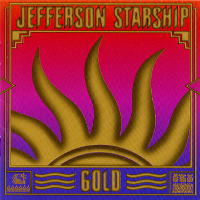
Jefferson Starship is an American rock band from San Francisco, California, formed in 1974 by a group of musicians including former members of Jefferson Airplane. Between 1974 and 1984, they released eight gold or platinum-selling studio albums, and one gold-selling compilation. The album Red Octopus went double-platinum, reaching No. 1 on the Billboard 200 chart in 1975. The band went through several major changes in personnel and genres through the years while retaining the Jefferson Starship name. The band name was retired in 1984, but it was picked up again in 1992 by a revival of the group led by Paul Kantner, which has continued since his death in 2016.

Arrival is the fourth studio album by the Swedish pop group ABBA. It was originally released in Sweden on 11 October 1976 by Polar Records. It became one of ABBA's most successful albums to date, producing three of their biggest hits: "Dancing Queen", "Money, Money, Money" and "Knowing Me, Knowing You". The track "Fernando", which had been recently released as a single in March 1976, was included on the Australian and New Zealand versions of the album. Arrival was the best-selling album of 1977 in the United Kingdom and was certified gold by the Recording Industry Association of America.

Knee Deep in the Hoopla is the debut album by American AOR band Starship, the succeeding musical project to Jefferson Starship. It was released on September 12, 1985, by RCA and Grunt, with four singles: the No. 1 hits "We Built This City" and "Sara", "Tomorrow Doesn't Matter Tonight" and "Before I Go".
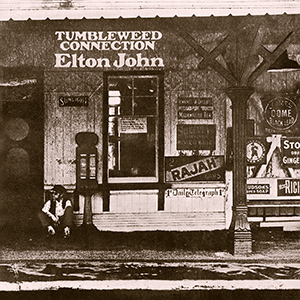
Tumbleweed Connection is the third studio album by English singer-songwriter Elton John. It was recorded at Trident Studios, London, in March 1970, and released in October 1970 in the UK and January 1971 in the US. It is a concept album based on country and western and Americana themes. All songs are written by John and Bernie Taupin, with the exception of "Love Song" by Lesley Duncan.

Rock of the Westies is the tenth studio album by English musician Elton John, released on 24 October 1975. The title is a pun on the phrase "West of the Rockies", the album having been recorded at Caribou Ranch in the Rocky Mountains of Colorado.
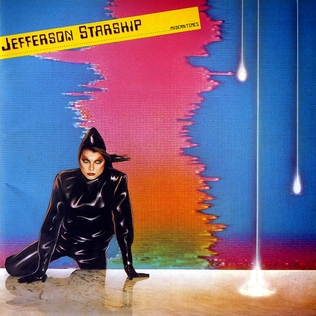
Modern Times is the sixth album by Jefferson Starship and was released in 1981. Grace Slick appeared on this album after a three-year absence. She returned near the end of the recording sessions, providing background vocals on some tracks as well as lead vocals on the single "Stranger" as a duet with lead singer Mickey Thomas. "Stranger" had previously been performed live by Jefferson Starship as early as December 1979, and the first studio version was made for Modern Times. Although not appearing in the band picture on the gatefold cover, Slick is listed on the back cover of the LP with the credit "Introducing Grace Slick" and her picture is on the lyric sleeve with the note "Grace Slick courtesy of Grace Slick." She joined the band officially for the 1981 tour. This was the first Jefferson Starship album to have promotional music videos. It was also the first album to feature a charting single on the Mainstream Rock Tracks chart, which had premiered earlier in the year. The single "Find Your Way Back" reached No. 3 on the Mainstream Rock chart.

Red Octopus is the second album by American rock band Jefferson Starship, released on Grunt Records in 1975. Certified double platinum by RIAA in 1995, it is the best-selling album by any incarnation of Jefferson Airplane and its spin-off groups. The single "Miracles" was the highest-charting single any permutation of the band had until Starship's "We Built This City" a decade later, ultimately peaking at No. 3 on the Billboard singles chart; the album itself reached No. 1 for four non-consecutive weeks on the Billboard 200. As was common in the era, stereo and quadraphonic mixes of the album were released concurrently.

Bark is the sixth studio album by American rock band Jefferson Airplane. Released in 1971 as Grunt FTR-1001, the album is one of the Airplane's late-period works, notable for the group's first personnel changes since 1966. The album was the first without band founder Marty Balin and the first with violinist Papa John Creach. Drummer Spencer Dryden had been replaced by Joey Covington in early 1970 after a lengthy transitional period in which both musicians had performed with the band.

The State of Art is on Fire is an EP by American punk rock band Rocket from the Crypt. It was released in 1995 on Sympathy for the Record Industry. The album was the band's first release to include trumpet player JC 2000.

Love Among the Cannibals is the third album released in 1989 by rock band Starship. It was the first album after Grace Slick's departure from the band, and their last full-length studio release until Loveless Fascination in 2013. The album marks a shift in the band's musical direction, featuring a harder edged, AOR style as opposed to the synth pop of their first two albums. Another departure from the preceding albums is the decrease in outside writers, as this album features four songs written by Thomas, Morgan, or Chaquico. The song "Wild Again" had previously been produced for the soundtrack to Cocktail (1988), and was included as a bonus track for the album's CD release. The album had one top 20 single on the Billboard charts, "It's Not Enough", which peaked at No. 12 in October 1989 and was their final Top-40 hit, but the album itself only climbed to No. 64 and single "I Didn't Mean To Stay All Night" was No. 75. The track "I'll Be There" was featured in the end credits of Gross Anatomy (1989).
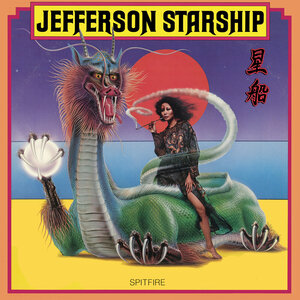
Spitfire is the third album by American rock band Jefferson Starship. Released in 1976, a year after the chart-topping Red Octopus, it quickly scaled the charts, peaking for six consecutive weeks at No. 3 in Billboard and attaining an RIAA platinum certification. Stereo and quadraphonic mixes of the album were released.
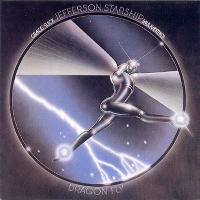
Dragon Fly is the debut album by Jefferson Starship, released on Grunt Records in 1974. It peaked at No. 11 on the Billboard 200, and has been certified a gold album. Credited to Grace Slick, Paul Kantner, and Jefferson Starship, the band itself was a turning point after a series of four albums centering on the partnership of Kantner and Slick during the disintegration of Jefferson Airplane through the early 1970s.

Winds of Change is the seventh album by Jefferson Starship and was released in 1982. It was the first studio album produced after Grace Slick rejoined the band as a full member. Aynsley Dunbar plays drums on the album, but was replaced by Donny Baldwin for the supporting tour. The album reached number 26 on the Billboard charts.
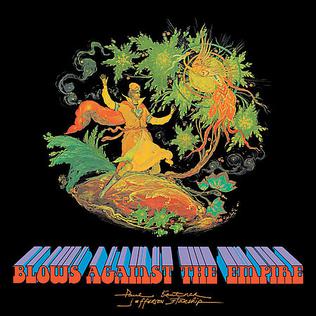
Blows Against the Empire is a concept album by Paul Kantner, released in 1970 under the name Paul Kantner and Jefferson Starship. It is the first album to use the "Starship" moniker, a name which Kantner and Grace Slick would later use for the band Jefferson Starship that emerged after Jack Casady and Jorma Kaukonen left Jefferson Airplane. From a commercial standpoint, it performed comparably to Jefferson Airplane albums of the era, peaking at No. 20 on the Billboard 200 and receiving a RIAA gold certification. It was the second album to be nominated for a Hugo Award in the category of Best Dramatic Presentation.

Album is the third studio album by Joan Jett and the second to feature her backing band the Blackhearts. It was released in July 1983.

Earth is the fourth album by American rock band Jefferson Starship. The album was recorded in 1977, with the same band lineup as the previous album, Spitfire and released in 1978.

"Miracles" is a song written by Marty Balin and originally recorded by Jefferson Starship, appearing on its 1975 album Red Octopus.

"Skies the Limit" is a song by British-American band Fleetwood Mac from their album Behind the Mask. It was written by Christine McVie and Eddy Quintela. In the US, the song was released as the album's second single in July 1990. Four months later, the song was issued as the album's third single in the UK. While the single did not chart on the US Billboard Hot 100, it did reach number 10 on the Billboard Adult Contemporary chart and number 40 on the Mainstream Rock chart. The moderate success of "Skies the Limit" and "Save Me" helped to push their parent album into the US and Canadian top 20, albeit only briefly.

"Runaway" is a 1978 song and single by Jefferson Starship, written by Nicholas Q. Dewey for the album Earth. It was the second U.S. Top 40 hit from that album, and was the follow-up to the Top 10 hit "Count On Me". The song peaked at #12 on the U.S. Billboard Hot 100 and number 13 on the Cash Box Top 100.
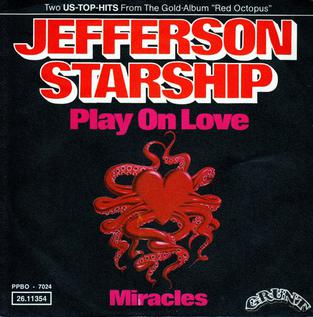
"Play on Love" is a 1975 song by Jefferson Starship. It was the second of two singles issued from their Red Octopus LP.
